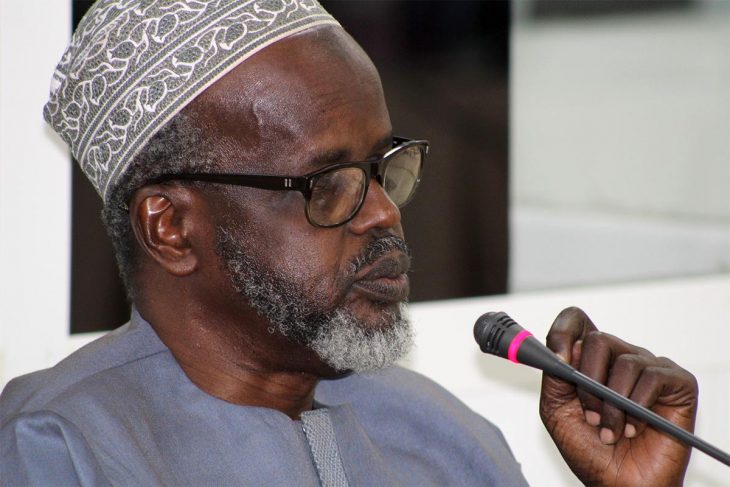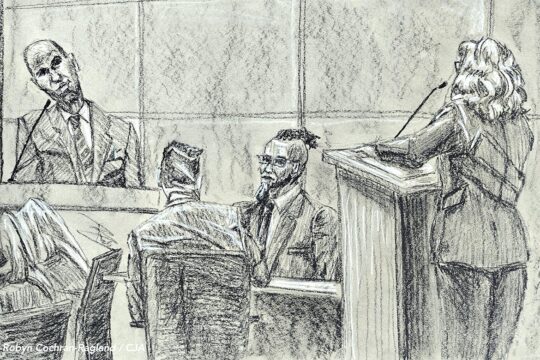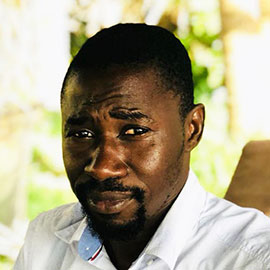In 2014, Yahya Jammeh shocked even his strongest critics when he said, in wolof, “dekabi mako mum” – I own this country. Gambia’s former leader also made religious pronouncements. He would tell Christians that the Bible bars eating pork. He would tell Muslims which day they should observe their religious fests.
One person who paid dearly for opposing Jammeh’s religious “mis-teachings”, as he sees it, is Imam Baba Leigh. Imam Baba Leigh is a controversial Gambian cleric. He is considered an ally to Gambia’s so-called progressive camp. He openly criticizes the practice of female genital mutilation. His views of the world and the religion often put him in opposite terrain to where the country’s Muslim leaders sit, the Supreme Islamic Council, which was established in 1992 and was composed of Saudi-trained clerics who allied with the former president.
Leigh and Jammeh did not see eye to eye on lots of issues but in December 2012 this would peak when Jammeh had death row prisoners executed and justified his order on religious grounds. Jammeh made his announcement at a meeting with Muslim leaders on Eid-al-Fitr, the day marking the end of Ramadan, the Muslim month of fasting. "All those guilty of serious crimes and condemned will face the full force of the law," Jammeh said in the 2012 meeting. "By the middle of next month, all the death sentences would have been carried out to the letter." A few days later, Jammeh ordered the execution of nine death row inmates.
Opposing executions under the guise of religion
Since the rule of the British colonialist in the Gambia, it has become a tradition for Muslim elders, from mainly the capital Banjul, to visit the State House on Eid-al-Fitr. This gives the Muslim leaders the opportunity to meet ministers and the President to discuss issues of mutual concern. Under Jammeh, this had become a platform for vitriolic attacks on opponents or for religious pronouncements.
Last year, some Junglers – a group of hitmen under the orders of Jammeh – testified before Gambia’s Truth, Reconciliation and Reparations Commission (TRRC) that after the death row inmates were executed, they were thrown into a well. Some died by suffocation in transportation vehicles as they were driven to the firing range. The people killed on that day were not even returned to their relatives.
“It was wrong,” said Imam Baba Leigh – who now serves as a commissioner at the National Human Rights Commission – on January 22 before the TRRC. “You cannot kill people in the name of Shariah [Islamic law] if they were not prosecuted under Islamic jurisprudence.”
Back in 2012, Leigh took his disagreement with Jammeh and his Supreme Islamic Council to the pulpit and the local newspapers. He took the issue to his Friday sermons. And he gave interviews to The Standard and The Daily News. Jammeh felted tested by Leigh’s actions. Leigh got warnings from close friends to lay low or leave the country. It would not take long before he was arrested and the two newspapers were ordered to shut down operations. “While in detention, state agents told me that if I wanted to get my freedom, I should say that I was misquoted by The Standard but I refused,” said Leigh.
Secret detention, torture in the name of Allah
At the time, the government refused to acknowledge the arrest of the cleric. Leigh was taken to the National Intelligence Agency where he was severely beaten. Omar Jallow, a Jungler who confessed to participating in the killing of 48 people, admitted last year before the TRRC that he had tortured Leigh. “They beat me, kicked me and even off cigarettes on my body. They beat me until I fainted,” confirmed the imam. "I was stripped naked. I sustained injuries on my back and there was no medical facility for treatment.”
In addition to a nine-day continuous torture in detention, Leigh was detained incommunicado at Mile 2 prison for more than five months before he was placed before the state broadcaster to publicly blame himself for his detention. In a televised plea, the secretary general of the government and religious leaders told Leigh that it was not Jammeh who arrested him and that his ordeal was ordained by Allah.
Humiliations in the moonlight
Imam Baba Leigh was not the only cleric who paid a hefty price for disagreeing with Jammeh.
On July 27, 2014 the president’s favored Supreme Islamic Council declared the following day as Eid-al-Fitr. The next day, Jammeh and his Council prayed. But a large section of the population and their clerics refused to pray. They considered that they needed to sight the moon before they ended their fasting while the Council relied on Saudi Arabia for moon sighting. Gambian scholars are heavily divided on the issue as to whether the country can fast on the moon sighting of Arabia. For Jammeh, there was no debate about it. “All those who did not pray today, they will not pray tomorrow. I own this country,” he declared on July 28 2014 in a meeting with the religious clerics who conferred on him the title of “leader of the people of faith”. The following day intelligence officers were dispatched to various mosques and places.
Sheikh Muhideen Hydara, a venerable Muslim cleric who was then in his late 80’s, was a prominent voice in opposition to praying on a day imposed by Jammeh. The Hydaras are a revered clan of Muslims in West Africa. They are believed to be direct descendants of Prophet Muhammad. That didn’t protect him. Sheikh Muhideen Hydara was arrested and humiliated for not observing the end of Ramadan on the day proclaimed by Jammeh and his Islamic Council. He was eventually set free by a court in May 2015. In fact, the charges against him – disobeying the lawful orders made by Yahya Jammeh on the observations of Eid Prayers – could not stick. The court said Hydara broke no law in the Gambia. He was acquitted and discharged.
The Supreme Islamic Council under siege
Sheikh Muhideen Hydara died in early 2019. Before the TRRC his eldest son Abass Muhideen Hydara said his father’s humiliation and “illegal arrest” have contributed to his death.
Another cleric who fell victim to the collusion between the Council and Jammeh was Imam Ba Kawsu, a fearless critic of both Jammeh and the Council, and a traditionalist. Kawsu, who owned a Quranic memorization school, was arrested several times by state agents, leading to the closing down of his school. In 2012, he was arrested and held incommunicado for nine days during which he was reportedly tortured. He then fled the country for Casamance, in the south of Senegal, where he lived until 2015 when he was allowed to return.
Just like Kawsu blamed the Supreme Council for his arrest, Abass Hydara also blamed the Council for his father’s arrest and humiliation. “Imam Abdoulie Fatty [the Council’s secretary general to date] has told my father that he was the one who ordered his arrest,” testified Abass. The son of the late Sheikh Muhideen Hydara thinks the Council should be renamed, like the country’s infamous National Intelligence Agency was renamed State Intelligence Services after the end of the dictatorship.
The struggle over the control of the Supreme Islamic Council between the moderates, the traditionalists and the Saudi-trained clerics is not over.
TAMBADOU: “JAMMEH WILL FACE IMMEDIATE ARREST”
Gambia’s former dictator Yahya Jammeh, currently living in exile in Equatorial Guinea, has gotten himself back in his country’s news headlines. In a leaked conversation between him and his deputy party leader Ousman Jatta, Jammeh said he was on a holiday and would come to the Gambia at a time of his own choosing. He who never allowed protests during his 22-year rule, urged his party to take to the street and demand the implementation of an agreement he purportedly signed with the United Nations and Ecowas for his safe return. The agreement, he said, also protects his assets.
On January 16, Jammeh’s supporters took to the street in Banjul demanding, as he ordered them to do, that the “agreement be implemented”. This has caused a chain of reactions from victims of the former leader’s regime. At a press conference on January 21 the Center for Victims of Human Rights Violations called for a ban on Jammeh’s party, “until such time that the on-going TRRC is concluded and its recommendations implemented to enhance a smooth transitional justice process for us to reconcile and unite as a people and as a nation.”
But Jammeh also received a swift answer from Gambia’s Justice minister Abubacarr Tambadou. “If former President Yahya Jammeh ever comes back to this country, he will face immediate arrest and charges of the most serious kind, and no amount of irresponsible idle talk or political brinksmanship will prevent this from happening. He will be subjected to an accountability process like any ordinary accused person in this country," said Tambadou on January 19 at a gathering in Banjul.
On January 25, victims of Jammeh and activists took to the street to call for his arrest. Attending were country’s former vice-president Ousainou Darboe and former Agriculture minister Omar Amadou Jallow. Darboe, the leader of the United Democratic Party, was sent to prison by Jammeh for three years in 2016. “I am here to join the call for him to be prosecuted for atrocities committed against the people,” said Darboe.







